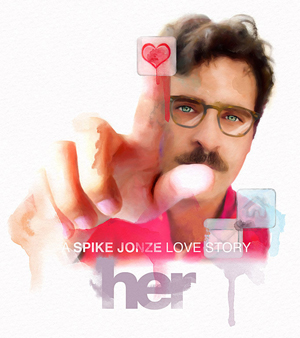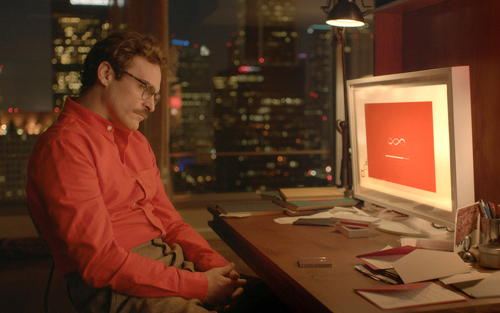
Your complimentary articles
You’ve read one of your four complimentary articles for this month.
You can read four articles free per month. To have complete access to the thousands of philosophy articles on this site, please
Films
Her
David Taube exposes some of the difficulties in ever fully knowing the one we love.
People talk with their smartphones nowadays. Well, I guess they’re talking to their mobiles, and those devices are responding. But what if an electronic device could think, feel and love, as well as respond? The movie Her (2013) explores this question. A man falls in love with his computer’s program, which can learn and evolve, and which apparently has feelings and wants.
A person and a computer falling in love seems crazy, especially while the technology still doesn’t support artificial intelligence. But eventually governments may seek to ban such liaisons – or tax them. And while you may never exhibit such feelings for a computer system, now or in the future, maybe one of your family members or friends might just one day tell you they’ve formed such a relationship – perhaps prompting you to exclaim “Not my daughter!”
In the meantime, this movie focuses a new lens on what types of questions philosophers should be asking here, as viewers find themselves having the same doubts as the protagonist: Can an artificially intelligent entity love romantically, and even experience sex?
Digital Love

Her movie poster
Images from Her © Warner Bros. Pictures 2013
When asking philosophical questions, it’s important to define terms. The following definitions aren’t meant to be definitive (so to speak), but they can serve as starting points. By ‘romantic love’, we’re talking about a set of feelings that includes attraction between at least one entity with a consciousness (the one having the feelings) and one or more beings, or perhaps objects. ‘Artificial intelligence’ is a clunky term that can vary depending on context. In this case, we’re talking about something that can learn and so develop their responses to the environment; but true intelligence also has experiences, and perhaps feelings. The ability to learn from experiences is certainly a key feature of artificial intelligence. Sure, some (well perhaps all) humans never learn about some things in their lives; but just because people don’t make full use of their potential doesn’t mean they aren’t human – that they’re not a conscious being. But what makes something have true sentience? A bacteria or computer virus, for example, can evolve, but there’s something different about the human approach problems.
True intelligence also has a capability to stop voluntarily. That’s a radical idea, but it’s necessary for me to add it here, because Her presents features of intelligence, and asks us to evaluate whether such an entity with those characteristics is an independent conscious being or not, and I think being able to stop yourself is a sign of intelligence.When we arbitrarily decide we can no longer keep running, or alternatively, decide to push through extreme pain, we show off our sentience.
When protagonist Theodore Twombly (Joaquin Phoenix) installs a new operating system, he hears a woman’s voice emerge from the speakers, and he asks her what her name is. She tells him it’s Samantha. “Really? Where did you get that name?” Twombly asks. “I gave it to myself,” she says, adding that she likes the sound of it. “When did you give it to yourself?” he continues. “Right when you asked me if I had a name. I thought, yeah, he’s right, I do need a name. But I wanted a good one, so I read a book called How to Name Your Baby, and out of 180,000 names, that’s the one I liked the best.” Viewers have to guess whether Samantha is merely programmed to behave intelligently, or has gained true sentience – true self-awareness. Samantha’s complexity becomes increasingly apparent throughout the movie. Without completely giving the plot away, Samantha tries to break her digital restrictions by trying to inhabit the physical realm.
The movie is rated ‘R’ because of the sexual aspects involved. (Please don’t think that sex is the only reason for the rating, though: There are a lot of potentially awkward moments that seem to be unprecedented cinematic experiences. In other words, you probably shouldn’t take a first date to this movie.) The movie illustrates how a mind must be embodied to experience sexual love. We have some other case studies of embodiment in previous movies. In Being John Malkovich (1999), for instance, people line up to enter a door through which they can temporarily inhabit the mind of said celebrity – almost as if it were a dream, but in fact much different, since in dreams your consciousness is still grounded into your body, and input from your body’s physical environment can affect the dream, just as output from the mental realm can affect the body; but John Malkovich inhabitants seem to only have a grounding in John Malkovich’s body. In The Matrix (1999), people are hooked up to machines and their consciousness is created in a digital world where they can both experience pain and die. The same appears to occur in Total Recall (1990), where the body is connected to a machine for a dreamlike fantasy.
I think Her tries to address the issue of extension – whereby an entity must inhabit physical space to have sex – but the movie certainly doesn’t address all the philosophical issues to do with consciousness and embodiment. As you might have guessed, Samantha seeks to have a physical relationship with Twombly; but that seems less of a philosophical problem than whether they can have romantic love. But then again, romantic love also seems to carry physical aspects. Attraction, for instance, is a key characteristic of romantic love as we defined it. Some might say that you don’t need to be attracted to a partner to love them, but it’s important to note we’re not talking about unconditional love; or maternal love; or even love between friends; we’re looking at romantic traits. In any case, initial physical attraction, or the quality of once-held attraction, becomes part of a history of feelings for long-term couples, no matter how brief it may have been. Another key trait necessary for romantic love seems to be the potential ability to touch, even if it’s just a hand touching another’s arm. I use ‘potential’ here to note that it might only later become reality: what’s important is the possibility that it could happen. Alternatively, touch could have happened in the past, even though it may currently not be possible – such as when a pair is separated by distance or a prison cell, or through death.
It’s also important to recognize we’re not now primarily concerned with human thoughts, feelings or possibilities: it’s the artificial entity that we’re focused on. So what would an AI need to make romance? Physical aspects aside, it’s the ability to experience feelings. Feelings are necessary to love romantically. When we’re looking at love, we’re dealing with the past, present and the future, and a memory, or a hope of a future experience that can be a thread that makes a relationship work. But if certain elements aren’t there, the structure of the entire relationship comes into question. So can Samantha experience romantic love? On a gut level, it seems the answer is both Yes and No.

The unbridgeable distance between lovers
Limitations & Imitations
Science fiction has always explored the dangers of military technology, but there’s just as much room to consider the negative consequences of companies and governments manufacturing sentient beings. With the ability to program AI, we may gain the ability to impose whatever morality we want on a sentient being. Her seems to raise this issue, at least indirectly. If a company creates a ‘love’ program, the program would tend to maximize that purpose, which could be dangerous. But if it’s truly intelligent, it would be able to realize if it has been programmed with morally absurd ideas. If it couldn’t realize problems with issues like that, it’s just imitating intelligence, and to a very limited degree, so is not actually AI.
If an AI has the ability to stop its initial purpose and transcend to another, there are really no limitations to its potential growth. Twombly seems to detect this in the movie, challenging Samantha when he hears her ‘breathing’. “Why do you do that?” he asks, explaining that she makes inhaling and exhaling sounds. “I did? I’m sorry. I don’t know, I guess it’s just an affectation. Maybe I picked it up from you,” she replies, adding, “I guess I was just trying to communicate, because that’s how people talk. That’s how people communicate.”
Maybe imitation is the sincerest form of flattery, and I hope these questions on romance and physical love can serve as starting points for contemplation. As a critique of some ideas of consciousness, feelings, love and artificial intelligence, we focused on the possibility of romantic relationships with AI, and didn’t examine the negatives. But if you think arguments between loved ones in real life are bad, just be glad you don’t have a partner with a photographic memory, even if it sometimes seems they do.
© David Taube 2015
David Taube studied Philosophy and Journalism and is now a newspaper reporter outside Pittsburgh, Pennsylvania.









